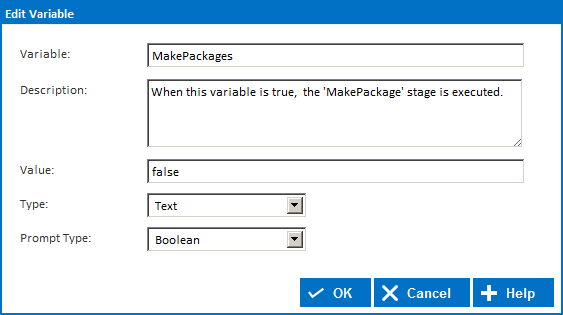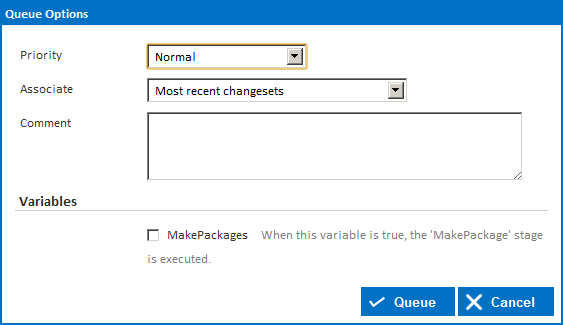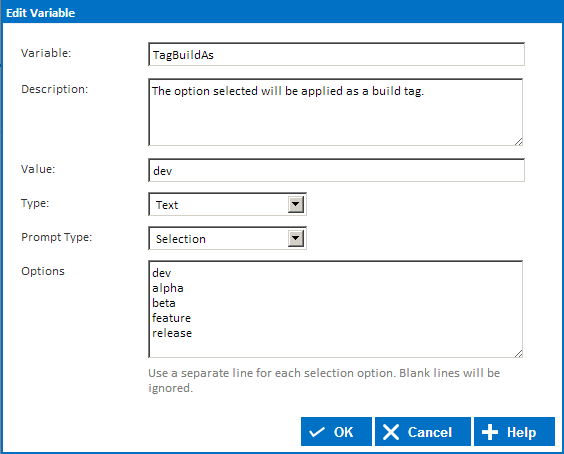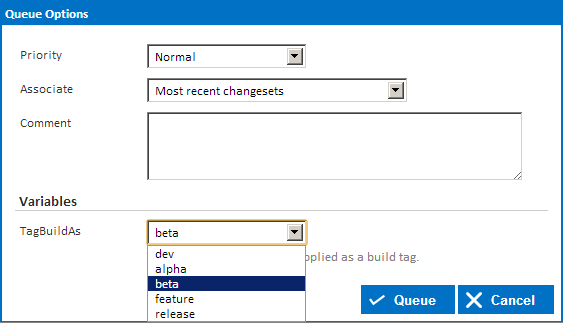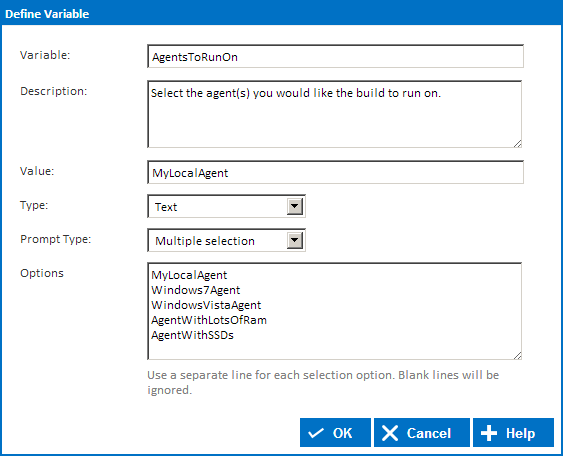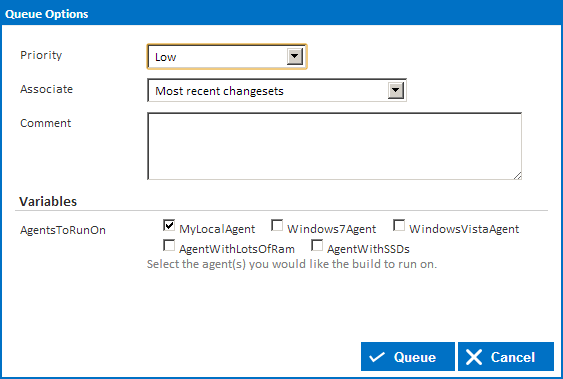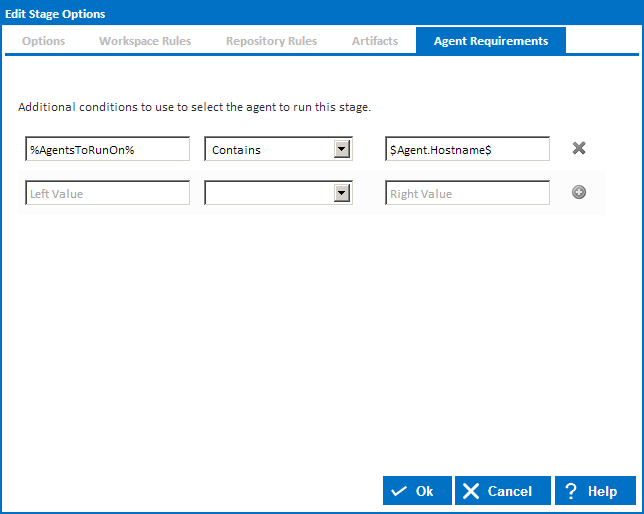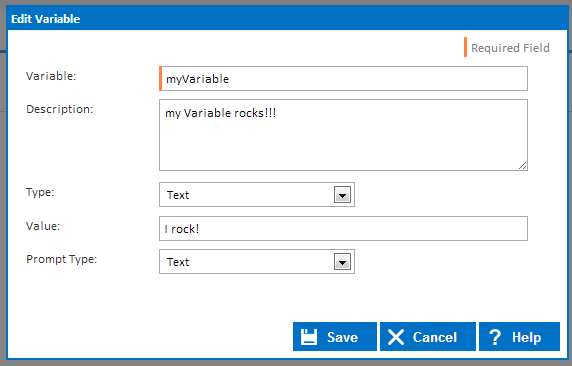...
Creating and Editing Variables
Configuration variables have an extra option when creating them, Prompt Type. If a prompt type is set, you will be required to supply a value for that variable when you manually start a build. The prompt type supplied determines the input field in which you supply the value.
Example 1 - Text Type/Boolean Prompt Type
In this example, I've created a variable called MakePackages and set it to a Boolean prompt type.
For demonstration purposes, the mock Configuration this variable belongs to has two stages. Stage 1 builds my project and out puts a bunch of file. Stage 2 takes the output of Stage 1 and generates an installer (a.k.a makes the packages). I don't want to make the packages every time I execute the configuration though so I've setup the configuration to only execute stage 2 when the MakePackages configuration variable is set to true. By making this a prompt type variable, I will be able to supply the value of this variable whenever I manually start a build. When I manually start a build, I will see the following dialog.
Under the Variables heading, you can see the MakePackages variable in a checkbox format. When you create a Boolean prompt type variable, it gets rendered as a checkbox because the value can either be true (checked) or false (unchecked). Now when you manually queue the configuration, you can set the value of the variable by checking or unchecking the checkbox.
Example 2 - Text Type/Selection Prompt Type
In this example, I've created a variable called TagBuildAs and set it to a Selection prompt type. This type of prompt type will display a text field in which you supply all the possible values for this variable. The value you supply in the Value field must be in the list of values you supply in the Options field.
For demonstration purposes, the mock Configuration this variable belongs to has a Tag Build action which contains the value %TagBuildAs% as one of its values. This means the build will be tagged with whatever value the variable TagBuildAs contains. By making TagBuildAs a selection prompt type variable, the user can select which value to use when manually starting a build. If you were to manually start a build, you would see the following dialog.
Now when you start a build you can specify the value from the drop down list.
Example 3 - Text Type/Multiple selection Prompt Type
In this example, I've created a variable called AgentsToRunOn and set it to a Multiple selection prompt type. This type of prompt type will display a text field in which you supply all the possible values for this variable. The value you supply in the Value field must be in the list of values you supply in the Options field.
As a result of this prompt type variable, you will now see each agent name with a checkbox next to it when you manually start a build.
For demonstration purposes, the mock Configuration this variable belongs to has a check before each stage (using Agent Requirements in Stage Options) that checks to see if the Agent's hostname is in the list of options you selected when the build was manually started. Here's an example of what a stage might look like with this kind of agent requirement.
At build time, %AgentsToRunOn% will contain every value you ticked on the queue dialog, in other words, every agent host name you specified. By selecting the Contains operator then specifying the expression $Agent.Hostname$, you're basically saying "Only run this stage when the list of agents I selected on the queue dialog contains the name of any agent registered with Continua".
Note: When explicitly forcing a stage to run on an agent, you bypass all the advantages of agent compatibility. If the agent you forced a stage to run on is unable to execute the stage then the build will sit on the queue waiting for a compatible agent whose name is the one you explicitly told the stage to run on. It will not under any circumstance pick an agent that's compatible whose name doesn't match the one or ones you specified.
Configuration, Project and Application variables are all created in the same way through their respective pages. So configuration variables are created through the Configuration Wizard, project variables are created through the Project Wizard and application variables are created through the variables page in the administration section.
All variables, regardless of their namespace, are created in the same way. The only exception are Configuration variables which can also be assigned a prompt type.
When defining a variable, you can specify the following properties:
Name
The name is what you will reference whenever you call this variable. In the screenshot above, I would reference this variable with the following syntax: %myVariable%
Description
This description is shown on all variables pages and it is also displayed on the Queue Build dialog as help text.
Type
Variables can be set to several different types that affect which values can be stored in the variable. The Variable Types page has a full list of types and their definitions.
Value
This is the actual value that the variable will store. Note that all variables (except Build variables) will never change their value during the build process. Instead, if you change a variables value, it will create a build variable with the same name and the new value.
Prompt Type - Configuration Variables Only
Prompt types determine what values the user can specify when a build is queued manually. The Variable Prompt Types page has a full list of prompt type and their definitions.
